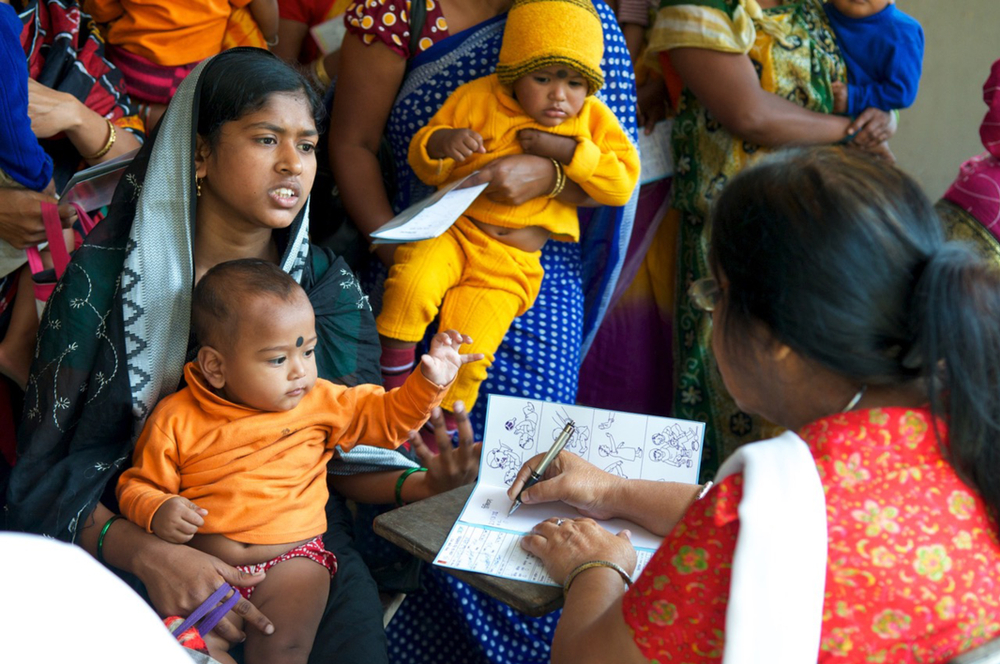An appeal to billionaires
Gates Foundation CEO Mark Suzman calls on the wealthy to step up and invest in programming to fight poverty and reduce inequality
Thursday, 01 February 2024

Gates Foundation CEO Mark Suzman calls on the wealthy to step up and invest in programming to fight poverty and reduce inequality
Thursday, 01 February 2024

 Mark Suzman is the chief executive officer of the Bill & Melinda Gates Foundation. Prior to becoming CEO he built and oversaw the development of the foundation’s offices in India, China, Africa, and Europe, and managed the foundation’s relationships with government, private philanthropists, and civil society. He also implemented a new system for how the foundation measures impact and manages trade-offs across its strategic priorities. Mark holds a doctorate in international relations from Oxford University, where he was a Rhodes Scholar. He earned his bachelor's degree, summa cum laude, from Harvard University.
Mark Suzman is the chief executive officer of the Bill & Melinda Gates Foundation. Prior to becoming CEO he built and oversaw the development of the foundation’s offices in India, China, Africa, and Europe, and managed the foundation’s relationships with government, private philanthropists, and civil society. He also implemented a new system for how the foundation measures impact and manages trade-offs across its strategic priorities. Mark holds a doctorate in international relations from Oxford University, where he was a Rhodes Scholar. He earned his bachelor's degree, summa cum laude, from Harvard University.
Last year, a man named Chuck Feeney died, at the age of 92. Feeney was a billionaire, but you might not have heard of him. He purposely led a low-profile life. He wore a ten-dollar watch and, in his final years, didn’t own a house or a car. The field where he made his billions, duty-free shopping, doesn’t grab many headlines.
You won’t find Feeney’s name carved on buildings - but his legacy is indelible. In 2011, Feeney joined the Giving Pledge, a movement of individuals with extraordinary wealth who commit to giving most of it to charitable causes during their lifetimes or in their wills.
At the time, he wrote, “I cannot think of a more personally rewarding and appropriate use of wealth than to give while one is living, to personally devote oneself to meaningful efforts to improve the human condition.”
What made Feeney remarkable isn’t what he said he’d do - it’s how thoroughly and thoughtfully he did it. He gave away virtually all his wealth while he was alive. And he gave it to a vast array of causes around the world: public health system strengthening in Vietnam, HIV clinics in South Africa, and grassroots campaigns to expand health care coverage to people with low incomes, to name a few.
Feeney’s humble but powerful philanthropy inspired so many people, including Warren Buffett and our foundation’s co-chairs, Bill Gates and Melinda French Gates. He showed us all how the actions of one generous person can set the wheels in motion for generations of progress.
That’s exactly what our foundation aims to do. We believe that everyone should have the chance to live a healthy and productive life, no matter who they are or where they live.
To make the biggest impact - which we measure in lives saved and livelihoods improved - we focus on areas of great human need in the United States and around the world.
We’re committed to spending down our endowment after our founders’ deaths because we’re focused on solving urgent problems now, and helping set up systems that will outlive us.
That’s why our board committed to increasing our annual payout to US$9bn by 2026. Earlier this month, they approved a 2024 budget of $8.6 bn, which we’ll use to fund innovative ways to save and improve lives.
Other philanthropists are stepping up too - and in this piece I’ll share why that makes me so hopeful about how much more we can achieve together at a time of great need and even greater opportunity.
“One of the most exciting parts of philanthropy (is that) it has the flexibility to adapt quickly and take risks others can’t, which can accelerate progress.”

Two billion people worldwide do not have access to safe drinking water. This impacts health and livelihoods. Photo: Shutterstock.
In the years since the Covid-19 pandemic, we’ve witnessed, after decades of decline, the rise of extreme poverty, a resurgence of deadly infectious diseases, climate disasters, and old wars and new ones.
It’s hard to grapple with the inequities. Parents bury their children, lost to diseases people in rich countries will never have to worry about. Women die in childbirth when they could have been saved with basic, low-cost interventions - simply because of their race, income, or where they happen to be born.
Hundreds of millions of people live on less than $2.15 a day - on the same planet where, during the first 24 months of the pandemic, billionaires’ wealth rose more than it had in the 23 years prior.
And just as needs are mounting, low-income countries have fewer resources with which to meet them.
Nearly half the world’s people now live in countries that spend more on servicing foreign debt than they do on health care. And official development assistance (ODA) - the grants and low-cost financing that help the poorest countries meet basic human needs - has steadily fallen in real terms, as wealthy countries spend more on other priorities at home and abroad.
The good news is that there are solutions - existing and emerging - that will improve and save lives despite these challenges. Innovative digital tools can help more women access economic opportunity. New interventions involving the gut microbiome can help solve malnutrition. Agricultural innovations can help farmers increase production, even in the face of extreme weather.
But these solutions need support, or they’ll wind up merely as wasted potential. The sooner that support comes, the more people we can help today - and the better off we’ll leave the next generation.
This starts with governments, who play the biggest and most essential role in making sure that solutions reach the people who need them. But governments face competing priorities and very real fiscal constraints. Too often, financial support for emerging crises comes at the expense of funding for fundamental health and development challenges.
Governments need to do more. So do multilateral organisations and private companies, which play a vital role in driving innovation and progress. And there’s another sector that has so much potential to make the world a fairer, healthier place - which brings me back to Chuck Feeney.
Thousands of people are thriving today because he saw gaps and helped fill them. That’s what philanthropy can do - on a massive scale. Philanthropists all over the world are finding new ways to give to reduce inequities. I hope they’ll do more, and that more people step up to join them.

Too many women die in childbirth due to a lack of low-cost and proven interventions. Philanthropy can help scale these programmes to lower-income countries. Photo: Shutterstock.
The world is filled with innovators training their sights on big challenges. But going from an idea to an actual solution in people’s hands? That doesn’t happen often enough—and when it does, philanthropy has often played a bigger role than people may realise.
Consider this: wild poliovirus once paralysed 7,000 children a week. In 2023, that number was only 12 children - over the entire year. That progress was possible because of brilliant innovators who discovered breakthroughs and frontline heroes who made sure that solutions reached children, even in the most remote parts of the world.
And so much of that was possible because of philanthropy; Rotary International, our foundation, and other organisations dedicated to a future where polio is a thing of the past.
This is just one example of how, in the last few decades, governments and nongovernmental organisations have made incredible advances in the fight against infectious diseases.
Gavi, the Vaccine Alliance, has facilitated the immunisation of more than one billion children. The Global Fund has saved 59 million lives from HIV, TB, and malaria. And the Carter Centre and its partners are on the verge of making Guinea worm disease, a debilitating parasitic infection, the second human disease in history to be wiped off the face of the earth.
These accomplishments have a few things in common. They reflect the hard work of thousands of people. And they all were made possible by philanthropic contributions. Part of that is the money itself. But how philanthropists direct their funds, and who they collaborate with, is just as important.
For our foundation, that means looking for market failures - that is, areas where the public and private sectors may not have enough incentive to step in, so progress is unlikely if philanthropies don’t act. And it means catalysing action from others, so that together, we can help scale lifesaving innovations and equip problem-solvers with the tools to go farther, faster.
This is one of the most exciting parts of philanthropy: it has the flexibility to adapt quickly and take risks others can’t, which can accelerate progress.
We move things forward, but we don’t do it alone. We do all our work in close collaboration with countries and communities to drive progress toward goals they’ve set - not the other way around.
After all, while philanthropy can take risks and help fill gaps that would otherwise be overlooked or underfunded, it only makes a difference when it works in partnership with governments, the private sector, and local experts.
“If every billionaire on earth donated 0.5 percent of their wealth, it would unlock $61bn dollars - enough to cover all the above and still have $49bn left over.”
Wherever I go, I’m asked what the Gates Foundation is doing about two major topics: climate change and artificial intelligence. Our foundation’s approach to these issues illustrates how we think about the role of philanthropy, and our role specifically.
First, climate change. The vast majority of climate spending goes toward mitigation efforts - that is, reducing carbon emissions. That’s critical for the future of our planet. But what about the effects that are already harming communities?
The fact is, the people who have done the least to contribute to this crisis - like smallholder farmers in sub-Saharan Africa - are already suffering its most severe consequences. Yet only about a tenth of global climate finance goes toward climate adaptation. And an even smaller fraction goes to interventions that would benefit the poorest.
So, working with governments and international groups like CGIAR, the world’s largest global agricultural research organisation, the Gates Foundation funds the R&D and delivery of solutions that expand the options available to farmers.
These innovations, such as chickens that are better able to survive disease and drought-tolerant strains of cassava, may not always be profitable for private companies to produce. But they have the potential to help millions of families grow their incomes. That’s exactly the kind of market failure we look to address.
Then there’s AI. When any new technology emerges, there’s a good chance that wealthy countries will harness its power while low-income countries are left behind. The same is true for AI - it won’t benefit poor communities unless it’s designed to.
Recently, we put out a call for proposals for researchers exploring the use of artificial intelligence to advance equity in global health and development. Nearly 80 percent of the proposals we received, and all the grants we selected, were from researchers in low- and middle-income countries.
They plan to use large language models to improve medical record-keeping for young women in Pakistan, provide non-judgmental HIV counselling in South Africa, produce personalised STEM lessons on video to Nigerian schoolchildren, broadcast information about malaria risks in local languages over Tanzanian radio - and so much more.
This work may still have happened without our involvement. But philanthropic support dramatically increases the likelihood that solutions will reach the people who need them, and soon.

Philanthropic funding played a key role in delivering Covid-19 vaccines. Photo: Shutterstock.
We’re proud of the role our foundation plays to help solve urgent problems - but we’re far from the only ones doing this work. There are so many philanthropists bringing novel approaches and unique expertise to a wide range of issues.
The philanthropic ecosystem looks different than it did when I started doing this work over 15 years ago, and that’s a good thing. Donors around the world are bringing bold vision and lived experience to complex challenges.
The African Philanthropy Forum helps African donors work together to drive inclusive, sustainable development across the continent. I’m excited by the work of foundations in India, China, and Singapore taking on local and global problems. As the next generation of philanthropists steps up, they’ll bring new ideas that raise the bar for what good giving looks like.
Of course, it’s not just the very wealthy who can make a difference. Small donations, taken together, make an enormous impact. Today, nearly half the world’s countries participate in GivingTuesday, a movement that has facilitated more than $13bn in donations since its creation in 2012.
And then there are the millions of people around the world who send money from each paycheck back to their families in their home countries. This kind of giving, called remittances, reached $590bn in 2020. That far surpassed all other sources of international aid combined.
You’d think that when people experience financial hardship, remittances would go down. But the opposite happens: People live with less so they can send more money home. During the Covid-19 pandemic, remittances went up - by 19 percent.
There’s so much generosity in the world. And there are more resources than ever before to help philanthropists translate their generosity into impact, from donor collaboratives - also referred to as collaborative funds - to new models of large-scale giving.
I know there are people genuinely committed to philanthropy with limited capacity to give today. But for those who can, starting now has enormous benefits.
For one thing, you’ll actually get to see the impact you make. You’ll also have time to build trust and understanding with the people doing the work. Strong partnerships are their own reward - but they also lead to greater impact. And the sooner you start, the more momentum you can build. That’s especially important when you’re working on issues where progress is measured not in months, or even years, but decades.
“If more people step up their commitments and focus their resources on the areas of greatest need, those ideas can translate to impact.”

Globally, the net worth of the world’s 2,640 billionaires is at least $12.2 tn. With $1bn, philanthropists could fund a set of high-impact, low-cost interventions that could save the lives of two million additional mothers and babies by 2030. Image: Shutterstock
There’s so much that was remarkable about Chuck Feeney’s giving, but one thing that sticks out to me is how he prioritised people furthest from opportunity. Most rich donors express a desire to give to social change - but in practice, a greater proportion of their giving goes to elite universities and cultural institutions.
Feeney did both. He gave nearly a billion to his alma mater, but he also gave billions to basic human needs. Imagine the possibilities if more donors followed his lead.
What if, alongside a $100m dollar gift to a highly selective university, they also gave $100m to set up a system that makes online textbooks free for every college student in the United States, forever? If a donor gave $20 m to an institution searching for a cure for cancer, and $20 m to fund research on malaria, a disease that still kills a child every minute? Or $5 m to their child’s private school and $5 m to support quality teaching across sub-Saharan Africa?
I know that very few people are willing or able to give away all their wealth. But there’s a lot of ground between Feeney’s blockbuster generosity and the current state of giving among the ultra-wealthy - and so many opportunities to make an impact.
Globally, the net worth of the world’s 2,640 billionaires is at least $12.2 tn. With $1bn, philanthropists could fund a set of high-impact, low-cost interventions that could save the lives of two million additional mothers and babies by 2030.
With $4bn, they could help a half-billion smallholder farmers become more climate resilient and reduce greenhouse gas emissions from agriculture by 1 gigaton a year by 2030. With just over $7bn, they could get vaccines to 300 million people, preventing at least 7 million deaths.
If every billionaire on earth donated 0.5 percent of their wealth, it would unlock $61bn dollars - enough to cover all the above and still have $49bn left over.
That kind of money could create so many opportunities for so many people - but only if it gets spent and is spent well.
In the United States, Canada, and Australia, philanthropic foundations are required to disburse at least five percent of their assets each year. I personally believe this could be higher - especially given that we’re talking about tax-advantaged dollars. Though it’s better than the current situation across most of Europe, where foundations face no payout requirements at all.
Today’s world has no shortage of complex problems to be tackled, or innovators ready to take them on. Around the world, they’re on the cusp of breakthroughs that can save and improve millions of lives. Some of these discoveries are already reaching people in need. Others will take some time but have the potential to change life as we know it. But without generous investment and persistent support, great ideas remain just that: ideas.
If more people step up their commitments and focus their resources on the areas of greatest need, those ideas can translate to impact. That means more farmers who can support their families no matter the weather, more children who don’t suffer from preventable diseases, and more mothers for whom childbirth is a source of joy, not fear.
Together, we can realise the full potential of philanthropy at the very moment the world needs it most.
This article was first published as the 2024 Gates Foundation Annual Letter. It is reproduced here with permission. For the original click here.
It's a good idea to use a strong password that you're not using elsewhere.
Remember password? Login here
Our content is free but you need to subscribe to unlock full access to our site.
Already subscribed? Login here
Sign in to access all of our content and resources.
Not subscribed? Register here. Forgotten your password? Reset here
Simply provide your email, and we'll send you a link to reset your password.
Remember password? Login here